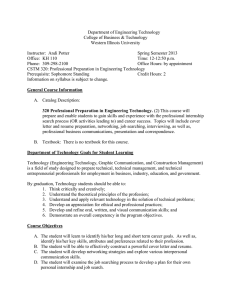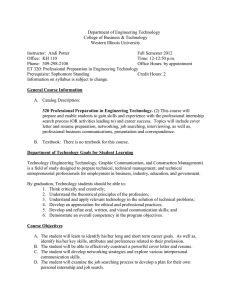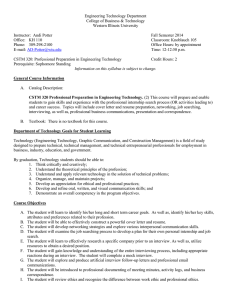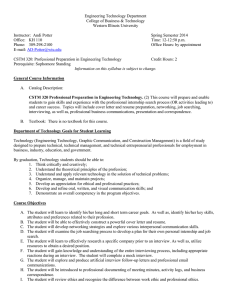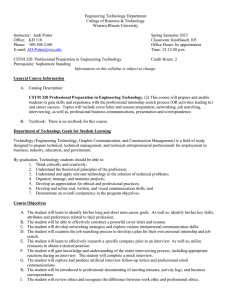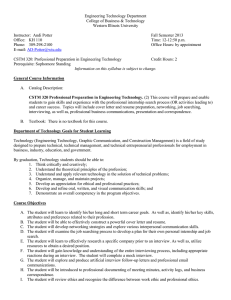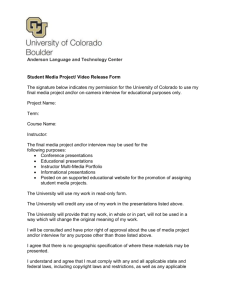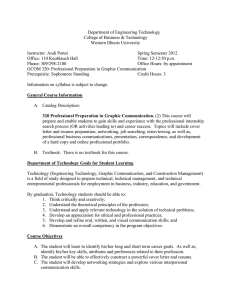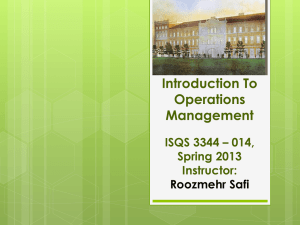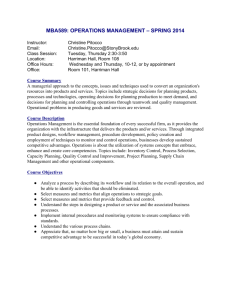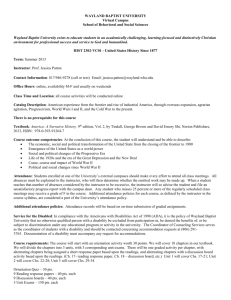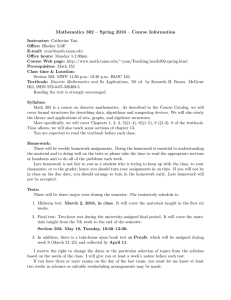Department of Engineering Technology College of Business & Technology Western Illinois University
advertisement
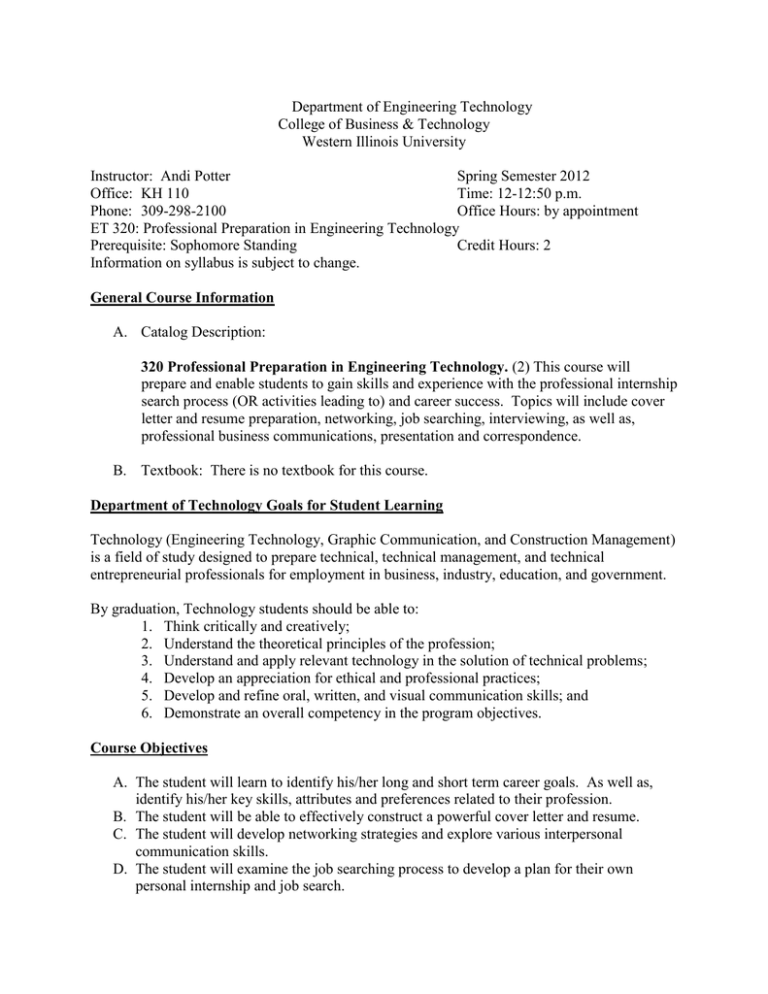
Department of Engineering Technology College of Business & Technology Western Illinois University Instructor: Andi Potter Spring Semester 2012 Office: KH 110 Time: 12-12:50 p.m. Phone: 309-298-2100 Office Hours: by appointment ET 320: Professional Preparation in Engineering Technology Prerequisite: Sophomore Standing Credit Hours: 2 Information on syllabus is subject to change. General Course Information A. Catalog Description: 320 Professional Preparation in Engineering Technology. (2) This course will prepare and enable students to gain skills and experience with the professional internship search process (OR activities leading to) and career success. Topics will include cover letter and resume preparation, networking, job searching, interviewing, as well as, professional business communications, presentation and correspondence. B. Textbook: There is no textbook for this course. Department of Technology Goals for Student Learning Technology (Engineering Technology, Graphic Communication, and Construction Management) is a field of study designed to prepare technical, technical management, and technical entrepreneurial professionals for employment in business, industry, education, and government. By graduation, Technology students should be able to: 1. Think critically and creatively; 2. Understand the theoretical principles of the profession; 3. Understand and apply relevant technology in the solution of technical problems; 4. Develop an appreciation for ethical and professional practices; 5. Develop and refine oral, written, and visual communication skills; and 6. Demonstrate an overall competency in the program objectives. Course Objectives A. The student will learn to identify his/her long and short term career goals. As well as, identify his/her key skills, attributes and preferences related to their profession. B. The student will be able to effectively construct a powerful cover letter and resume. C. The student will develop networking strategies and explore various interpersonal communication skills. D. The student will examine the job searching process to develop a plan for their own personal internship and job search. E. The student will learn to effectively research a specific company prior to an interview. As well as, utilize resources to obtain a desired position. F. The student will gain knowledge and understanding of the entire interviewing process, including appropriate reactions during an interview. The student will complete a mock interview. G. The student will explore and produce artificial interview follow-up letters and professional email communications. H. The student will be introduced to professional documenting of meeting minutes, activity logs, and business correspondence. I. The student will review ethics and recognize the difference between work ethic and professional ethics. Course Requirements Each student is expected to: A. ATTEND class. ATTENDANCE IS A MUST!!! This is a professional class, students must be prepared to interact, analyze, and discuss topics relating to course assignments. B. Prepare a sample resume and cover letter. C. Participate in class discussions and group activities. D. Compile a portfolio of all assignments, papers and projects from this course during Fall 2011 semester. E. Complete any examinations/quizzes when scheduled/given. F. Design and fabricate a project/activity as assigned. G. Complete all assignments by deadlines established. Student Evaluation A. B. C. D. E. F. G. H. I. J. K. Attendance and Participation Introduction Paper Cover Letter Resume Mock Interview Midterm - examinations/quizzes may include the following types of questions: True/False, Multiple Choice, Fill in the Blank, Listing, and Short Answer/Essay. Presentation Group Project - each team project/activity will be assessed based on quality and participation of team members. Portfolio - will serve as a major assessment tool. Professional Preparation Paper Final Grading Scale All points will be cumulative, totaled, ranked and graded according to the following +/- grading scale for this course: A= A- = B+ = B= B- = C+ = 92-100% 90-91% 88-89% 82-87% 80-81% 78-79% C= C- = D+ = D= D- = F= 72-77% 70-71% 68-69% 62-67% 60-61% 59% or below *WIU POLICY - Rules for Giving an Incomplete A temporary symbol of I (Incomplete) for a course may be given only when a student, due to circumstances beyond his or her control, has been unable to complete the course requirements within the official limits of the term. The circumstances must be documented to the instructor’s satisfaction. The mark "I", Incomplete, shall be assigned only to the student who has been in attendance and has done satisfactory work up to a time within four weeks of the close of the semester, including the examination period, and whose work is incomplete for reasons satisfactory to the instructor. Assignments/Points A. B. C. D. E. F. G. H. I. J. K. Attendance and Participation (40 pts): Students are expected to be present and ready to participate at all scheduled course times. Absenteeism will impede student success in this course. Introduction Paper (20 pts): This one page single spaced paper will consist of an introduction, body and closing paragraphs, and will be evaluated on organization, grammar and spelling. Cover Letter (30 pts): This letter will be graded on organization, effectiveness , grammar and spelling. Resume (50 pts): The resume will be evaluated on grammar, spelling, layout, organization and overall efficiency. Mock Interview (60 pts): Midterm (100 pts): This exam will assess all topics reviewed to this point. Presentation (50 pts): Each student will have a 10 minute maximum to present information on a specific company of interest. Companies will not be duplicated!! Power point is an excellent tool. Group Project (50 pts): Each group will review and evaluate a specific company of interest based on ethics. Companies cannot be duplicated!! Teamwork and communication skills will be the basis for this grade. Portfolio (140 pts): The portfolio will consist of the following items: cover letter, transcript, resume, career experience, references, professional email and a thank you letter. Each section will be assigned 20 pts and will be evaluated on comprehensiveness, grammar, and spelling. Professional Preparation Paper (60 pts): This two page single spaced paper will consist of an action plan the student will pursue to secure a prospective internship. Final (100 pts): This exam will assess all topics reviewed throughout the semester. Attendance AND Participation Introduction Paper Cover Letter Resume Mock Interview Midterm Presentation Group Project Portfolio Professional Preparation Paper Final Total Points 40 20 30 50 60 100 50 50 140 60 100 700 Extra credit may be granted upon instructor approval. Course Outline January 17 – T Introduction - Course Overview January 19 – Th Identifying Goals, Skills, Attributes for Your Profession January 24 – T Who Am I and What Do I Want? - Introduction Paper Assigned January 26 – Th Constructing a Powerful Cover Letter and Successful Resume January 31 – T Cover Letter and Resume Edits February 2 – Th Peer Review of Cover Letter and Resume February 7 – T Career Fair – Union Grand Ballroom - 10 a.m. – 3 p.m. February 9 – Th Networking Strategies and Interpersonal Communications February 14 – T Leadership Activity February 16 – Th Etiquette/Dress for Success February 21 – T Job Searching and Internship Preparations February 23 –Th Interviewing, Personal Presentation and First Impressions February 28 – T Career Services/Key Interview Questions/eRecruiting March 1 – Th Interviewing and Mock Interview Preparation March 6 – T Review – Resume/Cover Letter/Mock Interviews Reassigned March 8 – Th In-Class Mock Interviews March 12–16 Spring Break – NO CLASSES March 20 – T Effective Speakers and Midterm Review March 27 – T Presentations (five – 10 minute presentations) March 29 – Th Presentations (five – 10 minute presentations) April 3 – T Presentations (five – 10 minute presentations) April 5 – Th Presentations (five – 10 minute presentations) April 10 – T Professional Letters and Email Communications April 12 – Th Meeting Minutes, Activity Logs and Professional Correspondence April 17 – T Group Projects/Presentations (three – 10 minute presentations) April 19 – Th Group Projects/Presentations (three – 10 minute presentations) April 24 – T Work Ethic and Professional Ethics April 26 – Th Portfolio/Professional Success and Trends May 1 – T Professional Preparation Paper May 3 – Th Semester Review May 7–11 Final Exam Week – FINAL EXAM TIME TUESDAY, MAY 8, 2012 AT 1:00 P.M. General Considerations A. B. C. D. E. F. G. H. Each student should be in attendance for each class session. If an absence cannot be avoided, please inform the instructor of the circumstances PRIOR TO the scheduled class meeting time. Assignments should be completed on time, as scheduled, and according to criteria established by the instructor. The instructor will be available during posted office hours for general assistance although a prior appointment is desired. For assistance other than posted times, please make an appointment with the instructor. Smoking is not allowed in buildings on the WIU campus. Students should observe the following sequence for the resolution of problems: Student ----- Instructor ----- Chairperson ----- Dean The instructor reserves the right to alter course content if necessary. The guidelines for academic dishonesty are found in the WIU Code of Student Life. The last day to drop a class is Friday, October 30, 2011. Engineering Technology Department Policy Statements Statement on Academic Integrity: Preamble Western Illinois University, like all communities, functions best when its members treat one another with honesty, fairness, respect, and trust. Students have rights and responsibilities (http://www.wiu.edu/provost/students/) and students should realize that deception for individual gain is an offense against the members of the entire community, and it is the student's responsibility to be informed and to abide by all University regulations and policies on Academic Integrity. Plagiarism, cheating, and other forms of academic dishonesty constitute a serious violation of University conduct regulations. Students who engage in dishonesty in any form shall be charged with academic dishonesty. It is a duty of faculty members to take measures to preserve and transmit the values of the academic community in the learning environment that they create for their students and in their own academic pursuits. To this end, they are expected to instill in their students a respect for integrity and a desire to behave honestly. They are also expected to take measures to discourage student academic dishonesty, to adjust grades appropriately if academic dishonesty is encountered, and, when warranted, to recommend that additional administrative sanctions be considered. Grading policies are the exclusive prerogative of the faculty; administrative sanctions are under the authority of the Director of Student Judicial Programs. This document provides policies and procedures to be followed when academic dishonesty is encountered. Definitions of Academic Dishonesty The following definitions and examples are not meant to be exhaustive. The University reserves the right to determine, in a given instance, what action constitutes a violation of academic integrity. (See www.wiu.edu/policies/acintegrity.php for complete descriptions of the following topics: Plagiarism Fabrication and Falsification Cheating Complicity in Academic Dishonesty Abuse of Academic Materials Multiple Submissions Reporting Academic Dishonesty All members of the University community share the responsibility and authority to challenge and make known acts of apparent academic dishonesty. Any student, faculty member, or staff person who has witnessed an apparent act of student academic dishonesty, or has information that reasonably leads to the conclusion that such an act has occurred or has been attempted, has an ethical responsibility for reporting said act(s). Confronting and reporting academic dishonesty can be done in a variety of ways, and people should choose the manner most appropriate for the circumstances. Acts of apparent academic dishonesty that occur in the classroom should be reported directly to the course instructor, and/or the course instructor's Department Chair, and/or the instructor's College Dean. The Council on Admission, Graduation, and Academic Standards (CAGAS) or the Graduate Council will not accept or act upon anonymous reports, but will hold in strict confidence the identity of any person reporting a suspected instance of academic dishonesty, unless that person consents to having his/her identity revealed. Access & Disabilities: In accordance with University policy and the Americans with Disabilities Act (ADA), academic accommodations may be made for any student who notifies the instructor of the need for an accommodation. For the instructor to provide the proper accommodation(s), you must obtain documentation of the need for an accommodation through Disability Support Services and provide it to the instructor. It is imperative that you take the initiative to bring such needs to the instructor's attention, as he/she is not legally permitted to inquire about such particular needs of students. Students who may require special assistance in emergency evacuations (i.e. fire, tornado, etc.) should contact the instructor as to the most appropriate procedures to follow in such an emergency. Contact Disability Resource Center at 298-2512 for additional services. If you have emergency medical information to share with me, if you need special arrangements in case the building must be evacuated, or if you need accommodations in this course because of a disability, please make an appointment with me as soon as possible. My office location and hours are at the top of this syllabus. If you plan to request disability accommodations, you are expected to register with the Disability Resource Center (DRC) at 298-2512.
